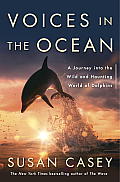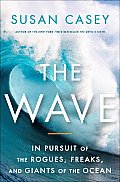
In 2010, the year dolphins came into my life, I spent my days working in midtown Manhattan, on the 36th floor of a big, impressive office building. I had a big, impressive job. At a glance, my situation was wonderful, enviable. Below the surface, however, the story was different. I was numb. I dragged myself around, and I wondered if I would ever feel happy again.
Eighteen months earlier, my father had died of a massive heart attack. I was often alone, but I never felt lonely because my father was only a phone call away. He was always there, dispensing wisdom and humor and love — until suddenly, he wasn't. I felt as though the ground had opened up and swallowed me and no matter how much time passed, I would never make it back to daylight.
The one place that seemed to offer solace was Maui. I'd lived there briefly, on the island's blustery north shore, while reporting my book, The Wave. Even when the trade winds were howling the air felt softer in the middle of the Pacific, far from the scouring energy of cities. And the ocean was where I went to escape my own thoughts. I returned to Hawaii as often as I could.
Voices in the Ocean begins on one of those visits. On a rainy summer evening, I drove 40 miles across Maui to visit Honolua, a bay that was sacred to the native Hawaiians. I was still operating on auto-pilot, going through the motions of life while at the same time feeling completely detached. When I arrived at Honolua the conditions were uninspiring, even dreary. Venturing into the ocean alone at dusk is always ill advised (especially given Maui's robust tiger shark population), but to me risk had no meaning: I truly didn't care. I waded into the water and headed across the bay, swimming until I was more than a half-mile offshore.
But it was not sharks, but dolphins who joined me in the water that evening. A pod of spinner dolphins, to be exact. There were 40 or 50 of them, and they emerged ghost-like out of the blue; as they approached their bodies seemed to materialize from the ocean itself. Spinners are smallish dolphins, but they were still far bigger than me, and they regarded me with open interest, swimming slowly and circling so I could stay among them. Despite having spent countless hours in the ocean I'd never been eye to eye with wild dolphins before; the experience was so strange and moving that it shattered my torpor — and in the weeks that followed, my sadness began to lift. It was replaced by fascination and curiosity and a consuming sense of wonder: the dolphins were unlike any creatures I'd encountered before, and I wanted to understand why.
Eventually I would quit my job, leaving New York City to spend two years traveling the world on a kind of dolphin odyssey. My journeys were intense — the relationship between our species and theirs is one of extremes. I met people who believed dolphins were angelic beings, sent down from the stars to guide us; and I met people who decapitated dolphins so they could pry out the animals' teeth to use as a currency. (In their society, it costs 1,000 dolphin teeth to buy a bride.) I met people who worshipped dolphins and people who ate them, people who had devoted their lives to saving dolphins, and people who made millions of dollars selling them to marine parks. I spent time with scientists who were investigating all manner of dolphin mysteries: the animals' complex and unusual brains, their cryptic communications, their close-knit bonds with one another — all of their amazing abilities, honed by 95 million years of evolution.
 While the facts about dolphins are always intriguing, as with everything in the ocean we know very little about them. What we have discovered is tantalizingly cool: at times, even the most empirical scientists have trouble maintaining their objectivity around dolphins. Back in the 1950s and '60s, one neuroscientist who had set out to study dolphins with Newtonian rigor was so startled by his experiences with the bottlenoses in his lab that his research accounts began to include statements like: "I believe we can presume that they have ethics, morals and regard for one another much more highly developed than does the human species."
While the facts about dolphins are always intriguing, as with everything in the ocean we know very little about them. What we have discovered is tantalizingly cool: at times, even the most empirical scientists have trouble maintaining their objectivity around dolphins. Back in the 1950s and '60s, one neuroscientist who had set out to study dolphins with Newtonian rigor was so startled by his experiences with the bottlenoses in his lab that his research accounts began to include statements like: "I believe we can presume that they have ethics, morals and regard for one another much more highly developed than does the human species."
This was John Lilly, whose dolphin investigations ultimately led him away from hard science and down a trippy, metaphysical path. Some of Lilly's dolphin experiments became infamous; they included taking LSD with the animals (in an attempt to commune with them), and constructing a flooded house in which a male dolphin and a young woman cohabited for six weeks (this turned out to be a very bad idea). Yet even as the scientific establishment balked, Lilly's pronouncements about dolphin and whale intelligence riveted people: the U.S. Marine Mammal Protection Act was inspired, in part, by his work.
Lilly is only one of a vast crew of colorful characters I encountered while diving into the dolphins' realm. On Hawaii's Big Island, I spent time in a "human-dolphin community" whose residents assert they have been called to live there by the dolphins themselves; I visited a town in Ireland where the most beloved citizen — and the reason the local economy thrives — is a lone wild dolphin. In the Greek islands I traced the history of a lost civilization that left behind a trove of magnificent, dolphin-themed artworks, the earliest representations we've found. Everything about this vanished people — whom archaeologists call the Minoans — is shrouded in mystery, but they left bold clues that their relationship with the ocean, the natural world, and the creatures who live in it, was reverent, harmonious — entirely different than ours.
As far back as you cast in history, people have been enthralled by dolphins. From the moment we met, we have recognized something unique in them. But the connection frayed over time and became almost completely lost, first replaced by notions of sea creatures as demons lurking in a dark and sinister underworld, then by the biblical idea of dominion, which holds that humans are meant to be in charge of nature, rather than part of it. Animals are "without feelings or awareness of any kind," the rationalist philosopher, René Descartes, wrote in 1649. They were no more sentient than machines, the Frenchman declared, and they certainly couldn't talk or think.
The joke was on him. Scientists have discovered that dolphins are not only masters of communication, enabling them to live in complex social cultures, they are self-aware and possibly even more emotionally attuned than we are. "It's like dolphins and whales are living in these massive undersea societies," said Hal Whitehead, a marine biologist from Dalhousie University, and author of the book, The Cultural Lives of Whales and Dolphins. "Really the closest analogy we have for it would be ourselves."
Knowing all this, you'd think we would treat them with great respect — but all too often, we don't. Some of the grimmest parts of my reporting took me to squalid marine parks, and to the hubs of dolphin trafficking, like the notorious cove in Taiji, Japan, where thousands of dolphins are sold or slaughtered each year. Dolphin captivity has become a multi-billion dollar global industry. In the wild, too, dolphins contend with an onslaught of harmful human activity: oil spills, toxic pollution, habitat destruction, overfishing, brain-pulping noise that reverberates through the ocean.
The danger, of course, is that in believing in our own dominion, we're losing our connection to the creatures that are as sentient as we are, just…not us. On its deepest level Voices in the Ocean is about what is important right now and what is not; what works and what doesn't; what we are doing in our own crazy lives and what we are doing to nature — and how we can find our way to a more fulfilling place. Dolphins give us a glimpse of something beyond reason, something grander than usual, and that small insight has been enough to keep us captivated throughout time. As I learned that evening in Honolua Bay, they have some serious magic to share with us, if we are willing to let them.